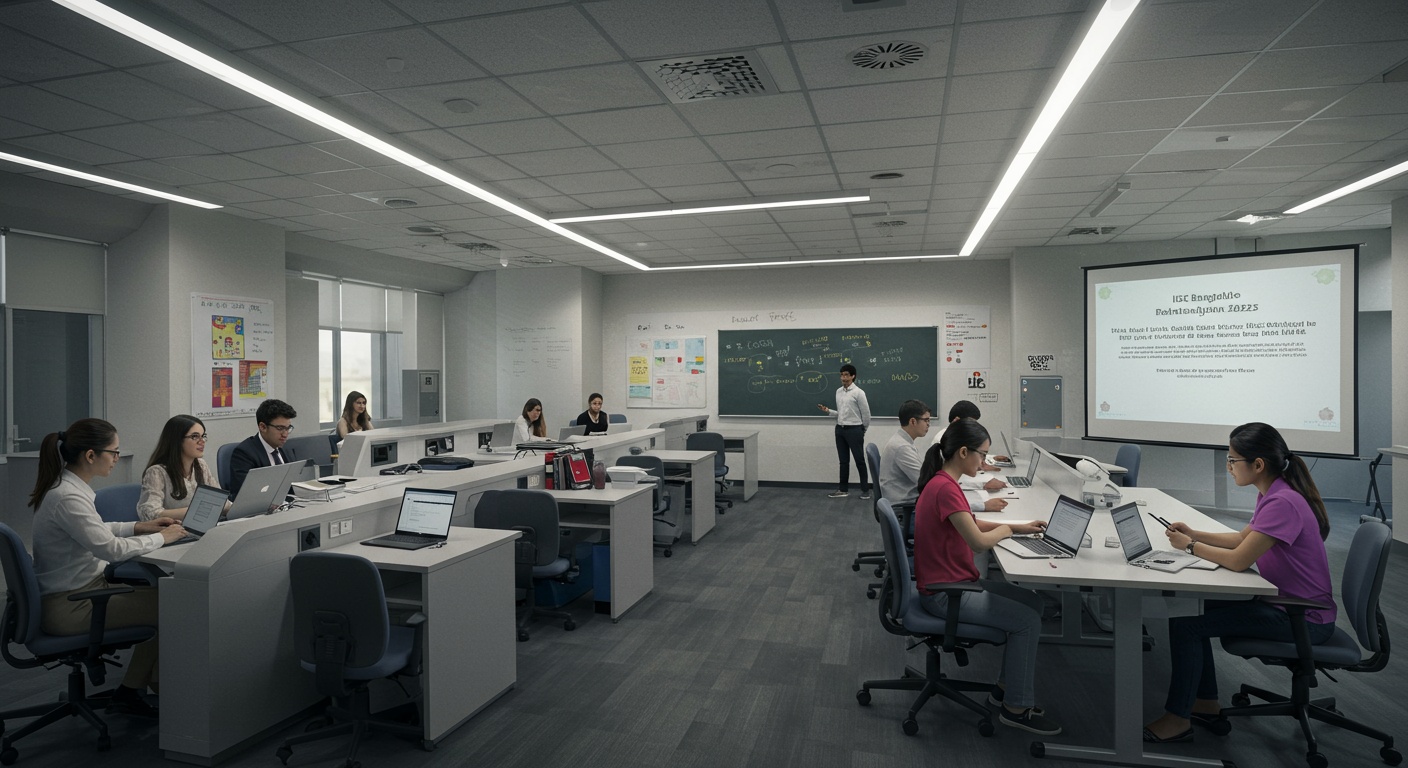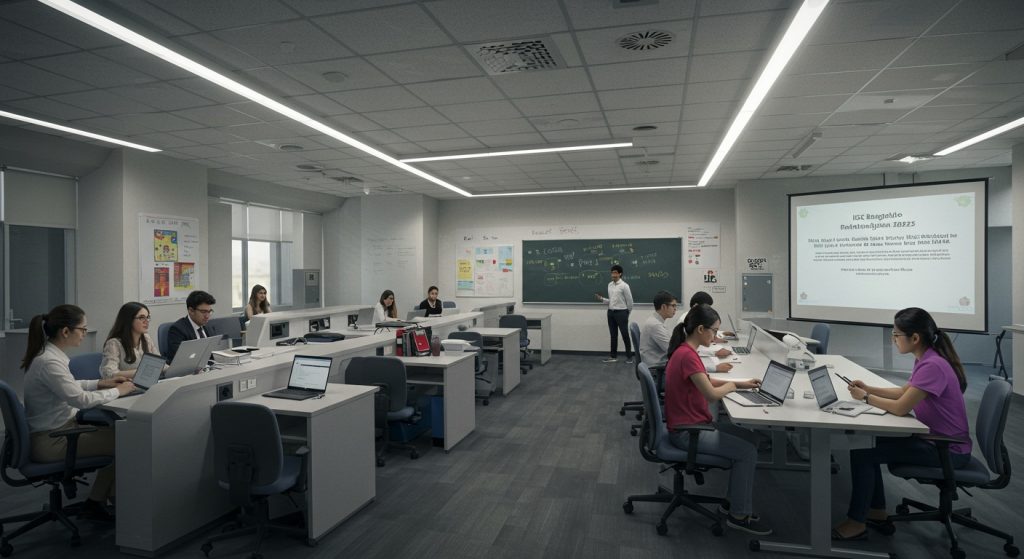In the fiercely competitive global landscape of higher education, understanding institutional performance is crucial. We examine IISc Bangalore’s projected ranking in 2025, amidst evolving metrics like research impact and international collaborations. Factors such as increased emphasis on citations per faculty and industry income are reshaping ranking methodologies. This analysis delves into IISc’s strengths and weaknesses, considering its performance against global benchmarks and other top Indian institutions. We will explore how strategic initiatives focused on innovation and global partnerships can influence its future standing, evaluating the impact of these efforts on both national and international rankings.

Understanding University Rankings: A Primer
University rankings have become a significant factor for prospective students, faculty. Researchers worldwide. They offer a comparative assessment of institutions based on various metrics, helping stakeholders make informed decisions. These rankings aren’t perfect and should be viewed as one factor among many. Understanding their methodologies is crucial for interpreting their results. Key aspects of ranking methodologies include:
- Academic Reputation: Surveys among academics to gauge the perceived quality of research and teaching.
- Employer Reputation: Surveys among employers to assess the employability of graduates.
- Faculty/Student Ratio: The number of faculty members relative to the number of students, often considered an indicator of teaching quality and accessibility.
- Citations per Faculty: Measures the research impact of an institution by analyzing the number of citations its publications receive.
- International Faculty/Students: Reflects the diversity and global appeal of the institution.
- Research Output and Impact: Assesses the quantity and quality of research publications.
Different ranking bodies, such as QS World University Rankings, Times Higher Education (THE). U. S. News & World Report, weigh these factors differently, leading to variations in rankings. It’s essential to consider the specific methodology used when interpreting a university’s position.
IISc Bangalore: A Profile
The Indian Institute of Science (IISc) Bangalore is a premier research institution in India, renowned for its contributions to science and engineering. Founded in 1909, IISc has consistently been at the forefront of scientific advancements in the country. Its key strengths include:
- Focus on Research: IISc prioritizes research across a wide spectrum of disciplines, from fundamental sciences to cutting-edge engineering technologies.
- High-Quality Faculty: The institute boasts a distinguished faculty, many of whom are internationally recognized experts in their respective fields.
- State-of-the-Art Infrastructure: IISc provides advanced research facilities, including specialized laboratories, computational resources. Libraries.
- Strong Industry Collaboration: The institute actively collaborates with industries to translate research into practical applications and foster innovation.
- Emphasis on Interdisciplinary Research: IISc encourages collaboration between different departments and disciplines, leading to innovative solutions to complex problems.
IISc’s commitment to excellence in research and education has consistently earned it top positions in national and international rankings.
Analyzing IISc Bangalore’s Performance in 2024 Rankings
Before projecting the 2025 rankings, it’s essential to comprehend IISc’s performance in the most recent rankings (2024). Key highlights include:
- QS World University Rankings 2024: IISc was ranked among the top universities globally, reflecting its strong research output and academic reputation.
- Times Higher Education World University Rankings 2024: IISc maintained a high position, particularly excelling in the citations and research categories.
- NIRF (National Institutional Ranking Framework) 2024: IISc secured the top position among Indian universities, reaffirming its national leadership in research and education.
Analyzing these rankings reveals that IISc’s strengths lie in its research impact, academic reputation. Faculty quality. But, areas for potential improvement include internationalization and industry collaboration, where some other institutions may perform better.
Factors Influencing IISc’s 2025 Ranking
Several factors could influence IISc’s ranking in 2025. These can be broadly categorized as internal and external factors:
- Internal Factors:
- Research Output and Quality: Continued growth in research publications and citations will positively impact the ranking.
- Faculty Recruitment and Retention: Attracting and retaining top faculty members is crucial for maintaining academic excellence.
- Infrastructure Development: Upgrading research facilities and expanding infrastructure will enhance research capabilities.
- International Collaborations: Strengthening partnerships with international institutions will improve global visibility and research impact.
- Industry Engagement: Enhancing collaboration with industries will translate research into practical applications and generate revenue.
- External Factors:
- Global Competition: The performance of other universities worldwide will influence IISc’s relative ranking.
- Funding and Resources: Government funding and private investments play a significant role in supporting research and development.
- Changes in Ranking Methodologies: Adjustments in the ranking criteria by different ranking bodies can impact IISc’s position.
- Geopolitical Factors: Global events and policies can influence international collaborations and research funding.
Projecting IISc Bangalore’s 2025 Ranking: A Scenario Analysis
Based on current trends and potential developments, we can project IISc’s ranking in 2025 under different scenarios:
- Optimistic Scenario: If IISc continues to improve its research output, attract top faculty. Strengthen international collaborations, it could climb further in global rankings. A possible improvement of 5-10 positions in QS and THE rankings is conceivable.
- Realistic Scenario: Assuming moderate progress in research and internationalization, IISc is likely to maintain its current position in the global rankings. It will likely continue to lead the NIRF rankings in India.
- Pessimistic Scenario: If there are significant challenges in funding, faculty recruitment, or research productivity, IISc’s ranking could slightly decline. But, its strong foundation and reputation are likely to prevent a drastic drop.
It’s crucial to note that these are projections based on available details and assumptions. The actual ranking may vary depending on unforeseen events and developments.
Strategies for IISc Bangalore to Enhance its Global Standing
To further enhance its global standing, IISc can focus on the following strategies:
- Increase Research Funding: Secure more research grants from government agencies and private organizations to support cutting-edge research projects.
- Attract Top Faculty: Offer competitive salaries and research opportunities to attract and retain leading researchers from around the world.
- Promote Interdisciplinary Research: Encourage collaboration between different departments and disciplines to foster innovation and address complex challenges.
- Strengthen International Collaborations: Establish partnerships with top universities and research institutions worldwide to promote knowledge exchange and joint research projects.
- Enhance Industry Engagement: Collaborate with industries to translate research into practical applications and generate revenue.
- Improve International Visibility: Actively promote IISc’s research and achievements through publications, conferences. Online platforms.
- Focus on Sustainability: Integrate sustainability principles into research and operations to address global challenges and attract environmentally conscious students and faculty.
By implementing these strategies, IISc can solidify its position as a leading research institution in India and enhance its global standing.
The Importance of Rankings: A Balanced Perspective
While university rankings can be useful indicators of institutional performance, it’s essential to maintain a balanced perspective. Rankings should not be the sole determinant of a university’s value or a student’s choice of institution. Other factors to consider include:
- Program Quality: The specific quality of the programs offered in a student’s chosen field of study.
- Research Opportunities: The availability of research opportunities and mentorship for students.
- Faculty Expertise: The expertise and experience of the faculty members in the relevant departments.
- Campus Culture: The overall environment and culture of the campus, including student life and extracurricular activities.
- Career Prospects: The career opportunities available to graduates in their chosen field.
- Personal Fit: The overall fit of the institution with a student’s individual goals, values. Preferences.
Ultimately, the best university for an individual is the one that provides the best learning environment and opportunities for personal and professional growth. IISc Bangalore, with its strong focus on research, excellent faculty. State-of-the-art infrastructure, remains a top choice for aspiring scientists and engineers in India and beyond.
Case Study: IISc Bangalore’s Contribution to COVID-19 Research
A real-world example of IISc Bangalore’s research impact is its contribution to COVID-19 research during the pandemic. IISc researchers developed several innovative solutions, including:
- Development of indigenous ventilators: IISc engineers designed and developed low-cost, portable ventilators to address the shortage of medical equipment during the pandemic.
- Research on virus transmission: IISc scientists conducted research on the transmission dynamics of the virus, providing valuable insights for public health interventions.
- Development of diagnostic tools: IISc researchers developed rapid and accurate diagnostic tests for COVID-19, enabling faster detection and treatment.
- Studies on vaccine efficacy: IISc scientists conducted studies on the efficacy of different COVID-19 vaccines, contributing to the understanding of vaccine effectiveness.
This case study highlights IISc’s ability to respond to real-world challenges and contribute to societal well-being through its research expertise. The institute’s contributions to COVID-19 research have enhanced its reputation and visibility, potentially impacting its future rankings.
Comparing IISc Bangalore with Other Top Indian Institutions
To provide a comprehensive perspective, it’s helpful to compare IISc Bangalore with other top Indian institutions, such as the Indian Institutes of Technology (IITs) and other leading universities. Here’s a comparative overview:
| Institution | Focus | Strengths | Areas for Improvement |
|---|---|---|---|
| IISc Bangalore | Research | Strong research output, high-quality faculty, advanced infrastructure | Internationalization, industry collaboration |
| IITs (e. G. , IIT Bombay, IIT Delhi) | Engineering and Technology | Strong engineering programs, large alumni network, industry connections | Research depth compared to IISc, interdisciplinary research |
| Other Leading Universities (e. G. , Delhi University, Jawaharlal Nehru University) | Diverse Disciplines | Strong humanities and social sciences programs, diverse student body | Research funding, infrastructure for science and technology |
While each institution has its unique strengths and areas for improvement, IISc Bangalore stands out for its strong focus on research and its contributions to scientific advancements. But, the IITs offer excellent engineering programs and strong industry connections, while other leading universities provide a diverse range of academic disciplines. The “best” institution depends on individual academic and career goals.
Conclusion
Looking ahead to 2025, IISc Bangalore’s continued success hinges on proactive adaptation to the evolving global research landscape. Having achieved a consistently high ranking, the institute’s next leap requires strategic investments in interdisciplinary research, particularly in areas like sustainable technologies and AI-driven healthcare solutions. The institute must foster stronger collaborations with international universities and industry partners to attract top talent and secure funding for ambitious projects. To realize this vision, IISc should prioritize cultivating a culture of innovation and entrepreneurship, encouraging faculty and students to translate research findings into tangible solutions. Consider implementing incubator programs and seed funding initiatives to support start-ups emerging from the institute. By focusing on these key areas, IISc can not only maintain its prestigious ranking but also significantly contribute to India’s technological advancement and global competitiveness. This requires dedication and a forward-thinking approach, ensuring that IISc remains a beacon of excellence for generations to come.
More Articles
Innovative Research At IIT: How Faculty Shape The Future
BSc Computer Science: Exploring Emerging Careers in Artificial Intelligence
BSc Computer Science: Building a Future in Blockchain and Web3 Development
Most Promising IIT Branches: Future Career Opportunities In 2025
FAQs
So, what’s the deal with IISc Bangalore’s ranking anyway? Why all the fuss about 2025?
Well, everyone’s keen to know how top universities like IISc are performing. The 2025 rankings are essential because they reflect recent improvements in research, teaching. Overall reputation. They give prospective students and employers a sense of where IISc stands both in India and globally. It’s like checking your favorite team’s position in the league table!
Okay. Are we actually predicting the 2025 rankings? Seems a bit like fortune-telling, right?
Haha, not exactly! While no one has a crystal ball, we can review past trends, current performance metrics (like research output, citations. Faculty quality). Ongoing initiatives at IISc to get a reasonable estimation of where it might land in the 2025 rankings. It’s more informed speculation than pure guesswork.
What ranking systems actually matter when we talk about IISc? Are some more essential than others?
Good question! The QS World University Rankings, Times Higher Education (THE). US News & World Report are generally considered the most influential globally. Within India, the NIRF (National Institutional Ranking Framework) is the most relevant. Each uses slightly different methodologies, so a university’s rank can vary across them. Paying attention to all of them gives a more rounded picture.
What kind of factors would really boost IISc’s position in the 2025 rankings?
Several things! Increased research funding leading to more high-impact publications, attracting top international faculty and students, strengthening industry collaborations. Improving the student-faculty ratio would all contribute positively. , anything that enhances the quality and visibility of its research and teaching efforts.
Let’s say IISc drops in the rankings. Is that a disaster? Should we all panic?
Not necessarily! Rankings are just one indicator of a university’s performance. A slight dip doesn’t automatically mean IISc has become a bad institution. It could be due to changes in the ranking methodology, increased competition from other universities, or temporary setbacks. It’s essential to look at the bigger picture and focus on long-term trends.
How does IISc’s ranking compare to other top Indian institutions like IITs?
IISc typically holds a very strong position, often leading the pack among Indian universities in global rankings. But, the IITs are also very competitive, especially in specific engineering disciplines. The rankings race between them is always interesting to watch and fuels healthy competition!
If I’m a student thinking of applying, should rankings be the only thing I consider?
Absolutely not! Rankings are helpful. They’re just one piece of the puzzle. Think about the specific programs you’re interested in, the research opportunities available, the faculty expertise, campus culture. Location. Ultimately, the best university for you is the one that aligns with your individual goals and preferences – not just the one with the highest rank.



